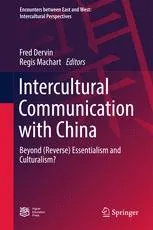Intercultural Communication with China: Beyond (Reverse) Essentialism and Culturalism?
4.7
Reviews from our users

You Can Ask your questions from this book's AI after Login
Each download or ask from book AI costs 2 points. To earn more free points, please visit the Points Guide Page and complete some valuable actions.Introduction to Intercultural Communication with China: Beyond (Reverse) Essentialism and Culturalism
In an increasingly interconnected world, intercultural communication plays a pivotal role in fostering understanding and collaboration across cultures. Intercultural Communication with China: Beyond (Reverse) Essentialism and Culturalism challenges traditional perspectives on intercultural discourse with China, offering a fresh and thoroughly nuanced approach to understanding cultural dynamics at play. The book takes readers on a journey that moves beyond surface-level stereotypes, aiming to dismantle and reframe the concepts of essentialism and culturalism that have long dictated narratives about Chinese culture.
Whether you're a student, a scholar, a business professional, or simply someone with a curiosity about bridging cultural divides, this book is for you. It investigates how cultural identities are created, performed, negotiated, and contested, demonstrating that communication between cultures like China and the rest of the world is much more dynamic than static labels imply. By blending theoretical insights with practical applications, the author offers readers a valuable guide to navigating today's global societies with sensitivity and competence.
Detailed Summary of the Book
Intercultural Communication with China is organized thematically to guide the reader through key concepts in contemporary cultural studies and communication theories. The book starts by critically exploring the constructs of essentialism and culturalism, terms that have historically framed the way China's identity is perceived. It explains how these constructs create rigid, oversimplified views of Chinese culture, establishing a foundation for cultural misunderstandings and prejudices.
Moving beyond stereotypes, the book introduces the notion of "dialogical interculturalism," which emphasizes the fluid and negotiated nature of identity and culture. This perspective foregrounds individual experiences and contextual interactions, rather than grand, monolithic cultural narratives. The text is interspersed with real-world examples, case studies, and stories of intercultural engagements—ranging from corporate settings to educational contexts—to demonstrate the vibrancy and complexity of cultural dialogue.
The book also provides an in-depth critique of "reverse essentialism"—the tendency to invert traditional cultural stereotypes by idealizing or romanticizing one culture over another. Using this critique, the author offers practical tools that promote meaningful communication while avoiding pitfalls of exoticism and oversimplification.
Key Takeaways
- Cultural identity is dynamic, contextual, and co-created through interaction, rather than static and predetermined.
- Essentialism and culturalism perpetuate harmful stereotypes that hinder productive intercultural communication.
- Effective communication with China requires moving beyond both Orientalist tropes and reverse essentialist frameworks.
- "Dialogical interculturalism" empowers individuals to engage meaningfully by prioritizing dialogue, empathy, and a contextual understanding of culture.
- Practical strategies—including active listening, openness, and critical self-reflection—are crucial for avoiding miscommunication and fostering trust across cultural boundaries.
Famous Quotes from the Book
"A culture is not an unchanging artifact to be examined; it is a living process, constantly reshaped by those who inhabit it."
"When we oversimplify cultural differences, we reduce individuals to symbols, and conversations to caricatures."
"True intercultural communication is not about finding common ground, but about respecting the roots and dynamism of diversity."
Why This Book Matters
Intercultural Communication with China offers profound insights into the evolving landscape of global cultural interactions. In an age marked by rapid globalization and digital connectivity, the stakes for effective intercultural understanding have never been higher. Miscommunication, fueled by essentialist or stereotypical assumptions, can lead to social, professional, and geopolitical tensions. This book equips readers not just with theoretical knowledge, but also with actionable tools to foster mutual respect and understanding.
Furthermore, the book’s focus on China is particularly relevant today, as China's role on the global stage continues to expand. Whether you're engaging in diplomacy, trade, education, or personal relationships, understanding the intricacies of Chinese intercultural communication is key to building lasting and productive connections. However, the lessons within this book extend far beyond China—they are universally applicable for anyone seeking to navigate cultural diversity with competence and compassion.
By promoting a mindset that goes beyond oversimplified cultural labels and embracing the complexity of human identities, this book empowers its readers with the tools to thrive in an interconnected, multicultural world.
Free Direct Download
You Can Download this book after Login
Accessing books through legal platforms and public libraries not only supports the rights of authors and publishers but also contributes to the sustainability of reading culture. Before downloading, please take a moment to consider these options.
Find this book on other platforms:
WorldCat helps you find books in libraries worldwide.
See ratings, reviews, and discussions on Goodreads.
Find and buy rare or used books on AbeBooks.
1176
بازدید4.7
امتیاز50
نظر98%
رضایتReviews:
4.7
Based on 0 users review
"کیفیت چاپ عالی بود، خیلی راضیام"


